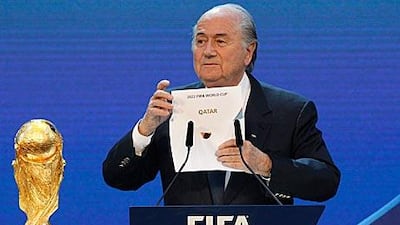Qatar was awarded the 2022 World Cup in a vote by the Fifa executive committee today. It beat competition from the United States, Australia, South Korea and Japan.
The Gulf country presented the most technically ambitious plans for a World Cup, using its 30-minute presentation to underline how the tournament could unify a region ravaged by conflict.
Qatar brings the World Cup to the smallest host ever but one which has unparalleled financial clout to stage the world's biggest single-sport event. It overcame objections about holding the games in desert heat and asked Fifa to take a "bold gamble."
"We go to new lands," Sepp Blatter, the Fifa president, said.
The United States and Australia had been tipped as favourites alongside Qatar for 2022. Japan and South Korea were also in the running.
"Thank you for believing in change," said Qatar's Emir, Sheikh Hamad bin Khalifa Al Thani.
Qatar will stage a World Cup in and around Doha in a desert summer but promises state-of-the-art technology to cool fans and players alike.
After the elimination of Australia, Japan and South Korea, it came down to a duel between the United States, promising huge commercial spoils in a key growth market, and the new territory of the Gulf region, still flush with riches despite the global financial crisis.
At malls in Doha, people gathered at electronic shops to watch the voting on television. On a busy Thursday night, the stores and restaurants were at a standstill as the vote was announced. And then came the huge roar when Blatter pulled "Qatar" out of the envelope.
Qataris and others – including workers from south Asia – immediately started dancing in the streets along Doha's Gulf waterfront. Some blew the vuvuzelas that became synonymous with the World Cup in South Africa.
"We have worked very hard over past two years to get to this point," Sheikh Hamad said. "Today we celebrate, but tomorrow, the work begins. We acknowledge there is a lot of work for us to do, but we also stand by our promise that we will deliver."
All through its lobbying effort, Qatar stressed that the compact nation had the money, resources and high-technology to overcome any logistical objections.
The tournament would be held when temperatures in Qatar typically exceed 48C and Fifa highlighted the potential risk posed by the heat.
Qatar, though, pointed out that World Cups in Mexico 1986 and United States 1994 also faced massive heat and both were big sporting successes.
Qatar is promising to spend US$50 billion (Dh183bn) on infrastructure upgrades and $4 billion to build nine stadiums and renovate three others. No stadium would be more than an hour apart, while many would be dismantled and sections would be sent to poor nations.
Meanwhile, Russia will host the 2018 tournament. They beat off bids from England, Spain-Portugal and Belgium-Netherlands.
Russia had called on Fifa to help shape the country's future, with bid officials saying the organization could help Russia achieve its modernising mission more quickly.
The bid was without Prime Minister Vladimir Putin, who decided to stay at home despite long being heralded as "team captain" of the campaign.
Geographically Qatar will be the smallest country ever to host the tournament, while Russia will be the largest.Voting totals for the 2018 and 2022 World Cup
The voting
2018 Tournament
First Round
England, 2 votes,
Belgium-Netherlands, 4
Spain-Portugal, 7
Russia, 9
(England eliminated)
Second Round
Belgium-Netherlands, 2
Spain-Portugal, 7
Russia, 13
(Russia wins with an absolute majority)
2022 Tournament
Australia, 1
Japan, 3
United States, 3
South Korea, 4
Qatar, 11
(Australia eliminated)
Second Round
Japan, 2
South Korea, 5
United States, 5
Qatar 10
(Japan eliminated)
Third Round
South Korea, 5
United States, 6
Qatar, 11
(South Korea eliminated)
Fourth Round
United States, 8
Qatar, 14
(Qatar wins with an absolute majority)

